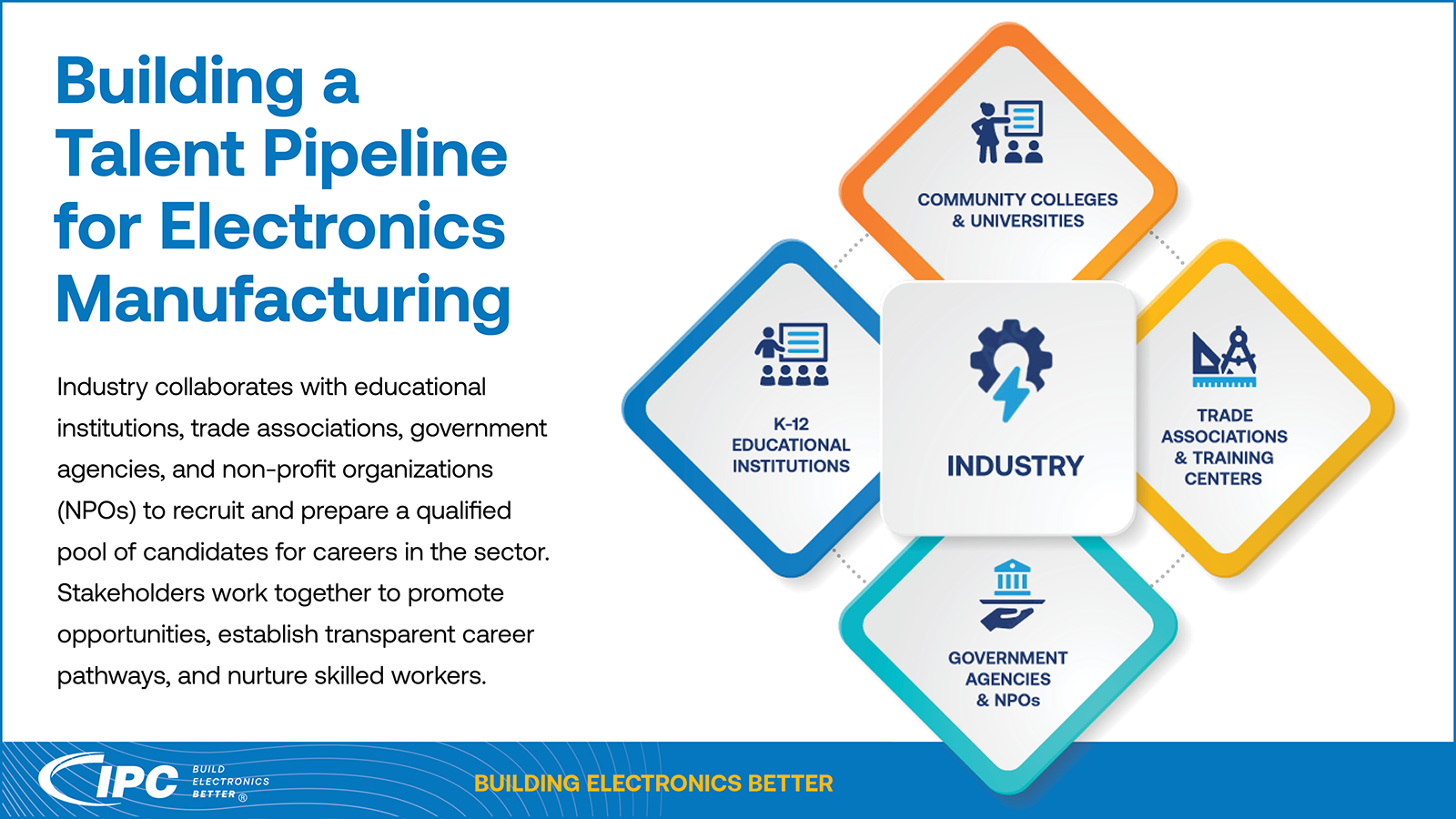Building a Talent Pipeline for Electronics Manufacturing
The Electronics Manufacturing Services (EMS) market is projected to grow from approximately $534 billion in 2023 to $856 billion in 2030. However, by the time the last baby boomers retire in 2031, the US manufacturing sector is estimated to have over 2 million unfilled jobs. These diverging trends are rooted in a historic shortage of qualified workers, which, if not addressed, could severely constrain industry growth for many years to come.
Decades of offshoring have led to a lack of training programs focused on preparing workers for a career in electronics manufacturing. Unlike fields such as HVAC, auto repair, plumbing, and construction, programs for PCB design and assembly are not widely available in educational institutions in the United States. In fact, most students, veterans, and workers transitioning to new careers are not even aware of the industry and the opportunities it has to offer.
As a result, individual American companies with little or no expertise in recruitment and education struggle to find workers and must develop their own, often inefficient, training programs from scratch. These issues, in turn, hamper a company’s ability to ramp up quickly, pivot to meet short timelines, and staff up to fulfill lucrative contracts. As the leading voice and advocate of the electronics manufacturing industry, IPC is implementing a strategy to address these challenges by cultivating a skilled and motivated workforce the industry can rely on well into the future.
An Industry Driven Pipeline
The core of IPC’s strategy lies in an industry-driven talent pipeline. A talent pipeline is a systematic and strategic approach to identifying, attracting, developing, and retaining skilled individuals to ensure a steady supply of qualified candidates. It includes proactive measures such as offering training programs, building relationships with educational institutions, raising awareness among potential candidates, and implementing apprenticeship programs:
- Industry-Specific Training and Certification Programs: The IPC Education Department works with industry experts to develop workforce training and certification programs that focus on the specific skills needed in electronics manufacturing. Many leading manufacturers already rely on IPCs suite of self-paced and online instructor-led courses to onboard, upskill, and certify their designers, engineers, technicians, and operators.
- Partnerships with Educational Institutions: The IPC Education Foundation collaborates with high schools, technical schools, community colleges, and universities to implement school-to-work programs designed to meet the needs of local employers. High schools in Littleton, Colorado, Lowell, Massachusetts, and Diboll, Texas have just completed the first IPC pre-apprenticeship program designed to prepare students for employment at their local PCB and wire harness fabrication and assembly facilities.
- Career Awareness and Outreach: The IPC Education Foundation's STEM outreach activities, student scholarships, student chapters, and Careers in Electronics website collectively aim to inspire and support the next generation of electronics manufacturing professionals. STEM outreach activities engage young students in hands-on learning experiences to spark interest in electronics and engineering. Student scholarships provide financial assistance to promising students pursuing relevant academic programs. Student chapters facilitate industry exposure, skill development, and networking opportunities through workshops, mentorship, and events. The Careers in Electronics website serves as a comprehensive resource for career guidance, educational opportunities, and job listings, helping individuals navigate and succeed in the electronics manufacturing industry.
- Internship and Apprenticeship Programs: The IPC Workforce Partnerships team is developing apprenticeship programs that equip students and entry-level workers with the technical competencies and knowledge required for various roles within the industry. Leading manufacturers have begun to adopt the first three Department of Labor-approved apprenticeship programs for Electronics Assemblers, PCB Designers, and PCB Fabricators, and more programs are on the way.
It Takes an Industry to Grow a Pipeline
IPC’s strategic approach offers a comprehensive solution to the workforce shortage in the industry. However, building workforce capacity requires mutually beneficial relationships between a robust cluster of stakeholders all working toward the singular goal of building a talent pipeline for electronics manufacturing. We invite industry experts and organizations to join us in this mission to build a talent pipeline that can quickly offset our current labor shortages and keep us on track to grow +$300 billion by 2030. Together, we can ensure a thriving and innovative electronics manufacturing sector.

